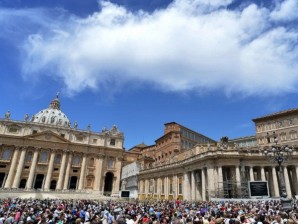
AFP FILE PHOTO/ALBERTO PIZZOLI
VATICAN CITY — The biggest trial in modern Vatican history wraps up on Saturday with a verdict expected in the case of Pope Benedict XVI’s ex-butler accused of leaking secret papers that revealed fraud scandals and intrigue.
Paolo Gabriele is accused of stealing hundreds of sensitive Vatican documents from the pope’s palace including letters from cardinals and politicians and papers the pope himself had marked “To Be Destroyed”.
The fourth and last hearing was expected to last just a few hours, with the prosecution and defense presenting their final arguments.
Gabriele will also have the chance to make a final statement to the court before the verdict, expected later on Saturday.
Gabriele claims he was a whistleblower who wanted to root out “evil and corruption” at the heart of the Catholic Church after observing that the 85-year-old pontiff was not well informed and perhaps even “manipulated”.
Using the codename “Maria”, Gabriele allegedly met with an Italian journalist over several months and passed him the confidential documents.
He has admitted responsibility for the leaks and says that his act was a reflection of the “widespread unease” in the world’s smallest state.
Vatican gendarmes said their search of Gabriele’s home in the Vatican had revealed more than 1,000 sensitive papal papers as well as a huge amount of printed material about freemasonry, spying techniques and Vatican finances.
Gabriele has alleged he was mistreated by the gendarmes when he was held for 53 days in two “security rooms” at the Vatican, complaining that the lights were kept on for 24 hours a day for the first three weeks of his detention.
The father-of-three is now under house arrest at his home in the Holy See.
The former butler was repeatedly interrupted by the presiding judge — one of three who will deliver the verdict — when he took the stand on Tuesday before he could fully explain his motivations or his network of sources.
The court also threw out a request from the defense to include in the trial a secret report compiled by a committee of cardinals who interviewed dozens of people in the Vatican in a parallel inquiry into the “Vatileaks” case.
A unique role
Gabriele did say, however, he had “many contacts” including two cardinals, a bishop and the former housekeeper of the pope who had confided in him.
But he distanced himself from comments he made during his interrogation in which he appeared to say that these people had “influenced” him.
He faces a sentence of up to four years in prison because the loyalty that his position carried – a unique role that made him one of the lay people who was closest to the pope – is seen by prosecutors as an aggravating factor.
The 46-year-old Gabriele has said he was “innocent” of the charge of theft but feels “guilty” of betraying the trust the pope had placed in him and he has written a personal letter to Benedict XVI asking for his forgiveness.
Even if Gabriele is convicted, legal experts say he is unlikely to be sent to prison until an appeals court upholds the conviction.
The Vatican also has no jail and he would have to be transferred to an Italian prison under a diplomatic agreement between the two states.
Many experts say it is unlikely to come to that and he will likely receive a pardon from the pope, who has been following the case closely.
Gianluigi Nuzzi, the Italian journalist to whom Gabriele has admitted passing the documents, called the butler “courageous” and said he wanted an inquiry into the allegations in the papers and not into how they were leaked.
The documents published in Nuzzi’s book “His Holiness: The Secret Papers of Benedict XVI” contained allegations of fraud in the running of the city state and cloak-and-dagger intrigue among the pope’s closest collaborators.
Many of the documents contained barbs against the Vatican’s powerful Secretary of State Tarcisio Bertone, a divisive figure who has expanded his powers since being appointed by the pope in 2006 and is challenged by some leading prelates.
The trial has been held in a courtroom decorated with a portrait of the pope and Vatican insignia in a part of the Holy See that is strictly off limits to the millions of tourists and pilgrims who visit St Peter’s every year.
The Vatican’s criminal law dates back to the 19th century and the pope holds wide powers including the right to dismiss a case before it goes to trial.
Some experts say the fact that the pope has not done so and that journalists have been allowed into the courtroom shows a desire for transparency.
The trial has also offered a rare glimpse into the daily life of the “pontifical family” made up of the pope’s secretaries and domestic staff.